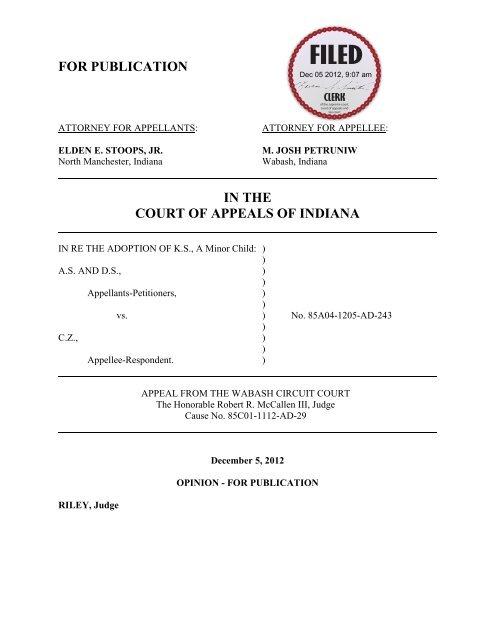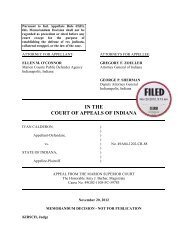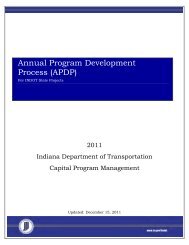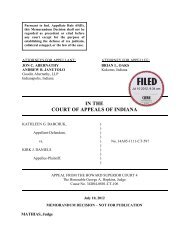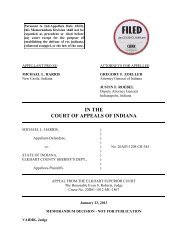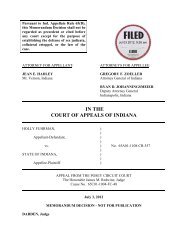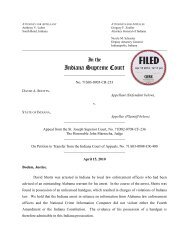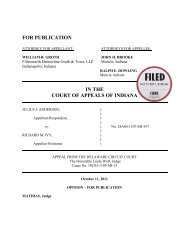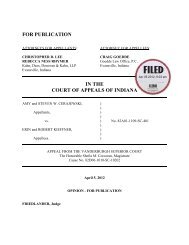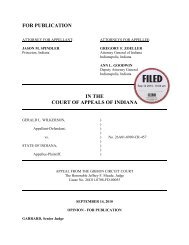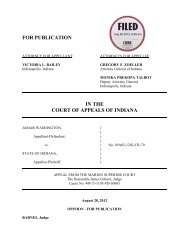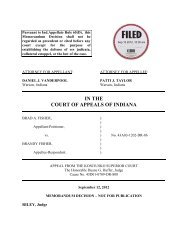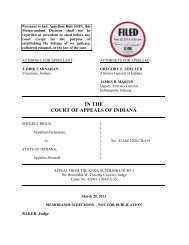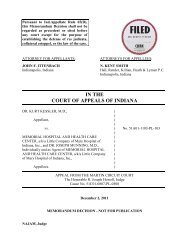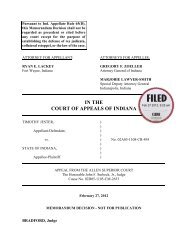AS and DS v. CZ - State of Indiana
AS and DS v. CZ - State of Indiana
AS and DS v. CZ - State of Indiana
You also want an ePaper? Increase the reach of your titles
YUMPU automatically turns print PDFs into web optimized ePapers that Google loves.
FOR PUBLICATION<br />
ATTORNEY FOR APPELLANTS:<br />
ELDEN E. STOOPS, JR.<br />
North Manchester, <strong>Indiana</strong><br />
ATTORNEY FOR APPELLEE:<br />
M. JOSH PETRUNIW<br />
Wabash, <strong>Indiana</strong><br />
IN THE<br />
COURT OF APPEALS OF INDIANA<br />
IN RE THE ADOPTION OF K.S., A Minor Child: )<br />
)<br />
A.S. AND D.S., )<br />
)<br />
Appellants-Petitioners, )<br />
)<br />
vs. ) No. 85A04-1205-AD-243<br />
)<br />
C.Z., )<br />
)<br />
Appellee-Respondent. )<br />
APPEAL FROM THE WAB<strong>AS</strong>H CIRCUIT COURT<br />
The Honorable Robert R. McCallen III, Judge<br />
Cause No. 85C01-1112-AD-29<br />
RILEY, Judge<br />
December 5, 2012<br />
OPINION - FOR PUBLICATION
STATEMENT OF THE C<strong>AS</strong>E<br />
Appellants-Petitioners, D.S. (Father) <strong>and</strong> A.S. (Stepmother) (collectively,<br />
Appellants), appeal the trial court’s denial <strong>of</strong> their Verified Petition for Adoption <strong>of</strong> the<br />
minor child, K.S.<br />
We reverse <strong>and</strong> rem<strong>and</strong> for further proceedings.<br />
ISSUE<br />
Appellants raise two issues on appeal, which we consolidate <strong>and</strong> restate as:<br />
Whether the trial court erred in concluding that the natural mother’s consent to the<br />
adoption <strong>of</strong> her minor child by Stepmother was required.<br />
FACTS AND PROCEDURAL HISTORY<br />
Father <strong>and</strong> C.P. (Mother) are the parents <strong>of</strong> K.S., born on January 4, 2005. On<br />
January 27, 2006, Father <strong>and</strong> Mother’s marriage was dissolved, with the parents being<br />
granted joint legal custody <strong>and</strong> Father receiving physical custody. Mother was granted<br />
visitation “as is agreed to between the parties from time to time.” (Appellant’s App. p.<br />
14). While the trial court did not enter a support order for K.S., the parties agreed that<br />
Mother “shall be responsible for assisting [Father] with the expenses related to the care<br />
<strong>and</strong> upbringing <strong>of</strong> the parties’ minor child.” (Appellant’s App. p. 14). On December 3,<br />
2009, Father filed a verified petition for support, which was granted by the trial court on<br />
January 11, 2010, setting a support order in the amount <strong>of</strong> forty dollars per week <strong>and</strong><br />
making the order retroactive to the date <strong>of</strong> filing. On October 11, 2010, Father married<br />
Step-Mother.<br />
2
From January to November 2010, Mother was employed either full-time or parttime.<br />
After November 2010, Mother was placed on bed rest due to complications related<br />
to her pregnancy.<br />
In September 2011, Mother gained full-time employment again,<br />
however, she resigned from her position the following month because she claimed that<br />
her daycare expenses for her two younger children would exceed her wages. At no point<br />
did Mother pay anything towards her support order for K.S. On May 4, 2012, the trial<br />
court held Mother in contempt for failing to pay child support. The trial court determined<br />
“[h]er arrears [to be] likely in excess <strong>of</strong> $10,000” <strong>and</strong> also sanctioned her to pay $500<br />
towards Father’s attorney fees. (Appellant’s App. p. 20).<br />
Between April 2009 <strong>and</strong> January 2010, Mother did not visit K.S. Throughout<br />
2010, Mother had sporadic visitation with K.S.: there were no overnight visits <strong>and</strong> she<br />
averaged eleven <strong>and</strong> one half hours <strong>of</strong> visitation per month. In 2011, Mother averaged<br />
nineteen <strong>and</strong> three-quarters hours <strong>of</strong> visitation per month, which included eight overnight<br />
visits. During the first three months <strong>of</strong> 2012, no visits occurred between Mother <strong>and</strong> K.S.<br />
During the eight overnight visitations, Mother tried to plan something special, like<br />
slumber parties or movies. She took K.S. to Halloween activities at the Zoo <strong>and</strong> bought<br />
her Holiday <strong>and</strong> birthday gifts. In April 2011, Mother took K.S. on a family trip to the<br />
<strong>Indiana</strong> Dunes. While other family members paid for Mother’s <strong>and</strong> K.S.’s trip, Mother<br />
purchased souvenirs <strong>and</strong> c<strong>and</strong>y for K.S.<br />
On December 19, 2011, Father <strong>and</strong> Step-Mother filed a verified petition for<br />
adoption <strong>and</strong> affidavit <strong>and</strong> request to terminate Mother’s parental rights to K.S. In their<br />
petition, Appellants requested the trial court to waive Mother’s consent to the adoption<br />
3
pursuant to Ind. Code § 31-19-9-8. On March 19, 2012, after a hearing, the trial court<br />
held that Appellants “have failed to prove by clear, cogent, <strong>and</strong> indubitable evidence that<br />
the [Mother’s] consent is not required.” (Appellant’s App. p. 12).<br />
Appellants now appeal. Additional facts will be provided as necessary.<br />
DISCUSSION AND DECISION<br />
Appellants contend that the trial court erred in denying their petition for adoption<br />
when it concluded that Mother’s consent for the adoption <strong>of</strong> her minor child is required<br />
pursuant to <strong>Indiana</strong> Code section 31-19-9-8.<br />
When reviewing the trial court’s ruling in an adoption proceeding, we will not<br />
disturb that ruling unless the evidence leads to but one conclusion, <strong>and</strong> the trial court<br />
reached the opposite conclusion. In Re Adoption <strong>of</strong> M.A.S., 815 N.E.2d 216, 218 (Ind.<br />
Ct. App. 2004). We will not reweigh the evidence, but instead will examine the evidence<br />
most favorable to the trial court’s decision together with reasonable inferences drawn<br />
therefrom, to determine whether sufficient evidence exists to sustain the decision. Id.<br />
The decision <strong>of</strong> the trial court is presumed to be correct, <strong>and</strong> it is the appellant’s burden to<br />
overcome that presumption. Id.<br />
The most protected status in any adoption proceeding is that <strong>of</strong> the natural parent.<br />
Stout v. Tippecanoe Co. Dept. <strong>of</strong> Public Welfare, 395 N.E.2d 444, 449 (Ind. Ct. App.<br />
1979). Recognizing the fundamental importance <strong>of</strong> the parent-child relationship, our<br />
courts have strictly construed the statute to preserve that relationship. Id. However, even<br />
the status <strong>of</strong> natural parent, though a material consideration, is not one which will void all<br />
4
others, <strong>and</strong> under carefully enumerated circumstances, the statute allows the trial court to<br />
dispense with parental consent <strong>and</strong> allow adoption <strong>of</strong> the child.<br />
<strong>Indiana</strong> Code section 31-19-11-1 provides that the trial court “shall grant the<br />
petition for adoption <strong>and</strong> enter an adoption decree” if the trial court hears evidence <strong>and</strong><br />
finds, in part, that “the adoption requested is in the best interest <strong>of</strong> the child” <strong>and</strong> “proper<br />
consent, if consent is necessary, to the adoption has been given.” According to <strong>Indiana</strong><br />
Code section 31-19-9-8(a):<br />
Consent to adoption, which may be required under section 1 <strong>of</strong> this chapter,<br />
is not required from any <strong>of</strong> the following:<br />
* * *<br />
(2) A parent <strong>of</strong> a child in the custody <strong>of</strong> another person if for a period <strong>of</strong> at<br />
least one (1) year the parent:<br />
* * *<br />
* * *<br />
(B) knowingly fails to provide for the care <strong>and</strong> support <strong>of</strong> the child<br />
when able to do so as required by law or judicial decree.<br />
(11) A parent if:<br />
(A) a petitioner for adoption proves by clear <strong>and</strong> convincing evidence that<br />
the parent is unfit to be a parent; <strong>and</strong><br />
(B) the best interests <strong>of</strong> the child sought to be adopted would be served if<br />
the court dispensed with the parent’s consent.<br />
Thus, Appellants were required to prove by clear <strong>and</strong> convincing evidence that Mother’s<br />
consent was not required. See In Re Adoption <strong>of</strong> T.W., 859 N.E.2d 1215, 1217 (Ind. Ct.<br />
5
App. 2006). 1<br />
The provisions <strong>of</strong> <strong>Indiana</strong> Code section 31-19-9-8 are written in the<br />
disjunctive; therefore they each provide independent grounds for dispensing with parental<br />
consent. In re Adoption <strong>of</strong> T.W., 859 N.E.2d 1215, 1218 (Ind. Ct. App. 2006).<br />
Regardless <strong>of</strong> which provision is relied upon, adoption is granted only if it is in the best<br />
interests <strong>of</strong> the child. I.C. § 31-19-11-1(a).<br />
Appellants now contend that despite receiving an income in 2010 <strong>and</strong> part <strong>of</strong><br />
2011, Mother willfully failed to financially support her minor child <strong>and</strong> therefore her<br />
consent to the adoption is no longer required. “A petitioner for adoption must show that<br />
the non-custodial parent had the ability to make the payments which he failed to make.”<br />
See In Re Adoption <strong>of</strong> Augustyniak, 505 N.E.2d 868, 873 (Ind. Ct. App. 1987), opinion on<br />
reh’g, 508 N.E.2d 1307, 1309 (Ind. Ct. App. 1987), trans. denied; Matter <strong>of</strong> Adoption <strong>of</strong><br />
D.H. III, 439 N.E.2d 1376, 1378 (Ind. Ct App. 1982). The mere showing that Mother<br />
had a regular income, st<strong>and</strong>ing alone, is not sufficient to indicate Mother’s ability to<br />
provide support. See In Re Adoption <strong>of</strong> Augustyniak, 508 N.E.2d at 1309 (Pro<strong>of</strong> <strong>of</strong><br />
employment <strong>and</strong> income are necessary components in determining the ability to provide<br />
support, but they are not the only components). Rather, we have stated that<br />
To determine that ability, it is necessary to consider the totality <strong>of</strong> the<br />
circumstances. In addition to income, it is necessary to consider whether<br />
that income is steady or sporadic <strong>and</strong> what the non-custodial parent’s<br />
necessary <strong>and</strong> reasonable expenses were during the period in question.<br />
In re adoption <strong>of</strong> K.F., 935 N.E.2d 282, 288 (Ind. Ct. App. 2010).<br />
1 Both parties allege—<strong>and</strong> we agree—that the trial court erred in requiring Appellants to prove the<br />
statutory elements by “clear, cogent, <strong>and</strong> indubitable evidence.” See Appellants’ App. p. 12.<br />
6
Here, the record reflects that Mother was employed between January <strong>and</strong><br />
November 2010, either full-time or part-time. After November 2010, Mother was placed<br />
on bed rest due to complications related to her pregnancy <strong>and</strong> did not return to work until<br />
September 2011. She resigned from her position the following month to stay at home<br />
with her two younger children. On May 4, 2012, fifteen days before the order in the<br />
adoption proceedings was issued, the trial court, after a hearing, held Mother in contempt<br />
for failing to pay child support. In the contempt proceedings, the trial court determined<br />
“[h]er arrears [to be] likely in excess <strong>of</strong> $10,000” <strong>and</strong> also sanctioned her to pay $500<br />
towards Father’s attorney fees. (Appellant’s App. p. 20). As we have noted previously, a<br />
trial court cannot hold a parent in contempt for failing to pay child support unless the<br />
parent had the ability to pay <strong>and</strong> the failure to do so was willful. In re Paternity <strong>of</strong><br />
C.N.S., 901 N.E.2d 1102, 1106 (Ind. Ct. App. 2009). Therefore, because Mother was<br />
found in contempt a mere fifteen days prior to the hearing in the instant cause, we must<br />
necessarily find that Mother had the ability to financially support K.S. <strong>and</strong> willfully failed<br />
to do so. Because the child support order was issued on January 11, 2010 <strong>and</strong> made<br />
retroactive to December 3, 2009 <strong>and</strong> the petition for adoption was filed on December 19,<br />
2011, Mother willfully failed to pay support for more than one year. See I.C. § 31-19-9-<br />
8(a)(2)(B). 2<br />
Mother points to our decision in M.W. v. A.W. (In re N.W.), 933 N.E.2d 909, 914<br />
(Ind. Ct. App. 2010), adopted in M.W. v. A.W. (In re N.W.), 941 N.E.2d 1042 (Ind. 2011),<br />
2<br />
Although the contempt order did not indicate the time period for which Mother failed to pay child<br />
support, Mother testified during the adoption proceedings that she had never financially contributed to<br />
K.S.’s support.<br />
7
which held that a parent’s duty to support a minor child can be defined in nonmonetary<br />
terms. As such, Mother references the trips they made <strong>and</strong> the gifts she purchased.<br />
While we agree with Mother’s interpretation <strong>of</strong> In re N.W., we find the case not<br />
dispositive in the instant situation. In N.W., mother was not subject to a judicial decree to<br />
pay child support; in fact, the trial court explicitly concluded that mother had a negative<br />
child support obligation. Id. As a result, we determined that “even though no court order<br />
to pay child support may exist, [m]other still had a duty to support N.W. However,<br />
because the trial court already determined that [m]other’s child support is negative, this<br />
‘duty <strong>of</strong> support’ might be defined in nonmonetary terms.” Id. To the contrary, here,<br />
Mother was subject to <strong>and</strong> found to be in contempt <strong>of</strong> a monetary child support order.<br />
Nevertheless, we are mindful that a petition for adoption is not automatically<br />
granted following a showing that a natural parent failed to provide support when able to<br />
do so.<br />
Once the statutory requirements are met, the court may then look to the<br />
arrangement which will be in the best interest <strong>of</strong> the child. Id. The purpose <strong>of</strong> <strong>Indiana</strong>’s<br />
adoption statutes is to protect <strong>and</strong> promote the welfare <strong>of</strong> children by providing them with<br />
stable family units. Id. On occasion we have observed that the relationship between<br />
parent <strong>and</strong> child is a bundle <strong>of</strong> human rights <strong>of</strong> such fundamental importance that<br />
adoption statutes, being in derogation <strong>of</strong> the common law, should be strictly construed in<br />
favor <strong>of</strong> a worthy parent <strong>and</strong> the preservation <strong>of</strong> such relationship. Id. at 914-15.<br />
However, in evaluating the parent-child relationship, the best interest <strong>of</strong> the child is<br />
paramount <strong>and</strong> our main concern should lie with the effect <strong>of</strong> the adoption on the reality<br />
<strong>of</strong> the minor child’s life. Id. at 915.<br />
8
During the instant proceedings, the parties <strong>and</strong> the trial court focused on the<br />
statutory requirements to waive Mother’s consent to the adoption <strong>of</strong> K.S. by Step-<br />
Mother. Specifically, the trial court noted on the record “the only issue today is consent.<br />
[] so, we’ll solve that today <strong>and</strong> then decide where we go from there.” (Transcript p. 4)<br />
The parties did not present any evidence with regard to the impact <strong>of</strong> the adoption on<br />
K.S.’s life <strong>and</strong> whether the severance <strong>of</strong> her ties with Mother would be in K.S.’s best<br />
interest. Therefore, we rem<strong>and</strong> to the trial court to determine whether the adoption will<br />
be in K.S.’s best interest. See I.C. § 31-19-11-1(a).<br />
CONCLUSION<br />
Based on the foregoing, we conclude that Mother’s consent to the adoption <strong>of</strong> her<br />
minor child by Stepmother was not required.<br />
However, we rem<strong>and</strong> for further<br />
proceedings to determine whether the adoption is in K.S.’s best interest.<br />
Reversed <strong>and</strong> rem<strong>and</strong>ed for further proceedings.<br />
BAILEY, J. <strong>and</strong> CRONE, J. concur<br />
9


